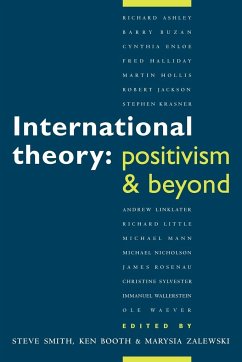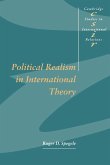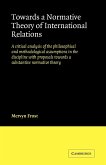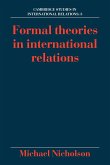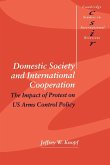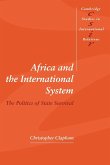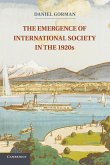Steve Smith / Ken Booth / Marysia Zalewski (eds.)Positivism and Beyond
International Theory
Positivism and Beyond
Herausgeber: Smith, Steve; Booth, Ken; Zalewski, Marysia
Steve Smith / Ken Booth / Marysia Zalewski (eds.)Positivism and Beyond
International Theory
Positivism and Beyond
Herausgeber: Smith, Steve; Booth, Ken; Zalewski, Marysia
- Broschiertes Buch
- Merkliste
- Auf die Merkliste
- Bewerten Bewerten
- Teilen
- Produkt teilen
- Produkterinnerung
- Produkterinnerung
This book brings together key figures who have made leading contributions to the development of international theory to provide a major survey of the state of the subject.
Andere Kunden interessierten sich auch für
![Political Realism in International Theory Political Realism in International Theory]() Roger D. SpegelePolitical Realism in International Theory28,99 €
Roger D. SpegelePolitical Realism in International Theory28,99 €![Towards a Normative Theory of International Relations Towards a Normative Theory of International Relations]() Mervyn FrostTowards a Normative Theory of International Relations35,99 €
Mervyn FrostTowards a Normative Theory of International Relations35,99 €![Formal Theories in International Relations Formal Theories in International Relations]() Michael NicholsonFormal Theories in International Relations31,99 €
Michael NicholsonFormal Theories in International Relations31,99 €![Domestic Society and International Cooperation Domestic Society and International Cooperation]() Jeffrey W. KnopfDomestic Society and International Cooperation32,99 €
Jeffrey W. KnopfDomestic Society and International Cooperation32,99 €![Africa and the International System Africa and the International System]() Christopher ClaphamAfrica and the International System35,99 €
Christopher ClaphamAfrica and the International System35,99 €![The International Organization of Credit The International Organization of Credit]() Randall D. GermainThe International Organization of Credit27,99 €
Randall D. GermainThe International Organization of Credit27,99 €![The Emergence of International Society in the 1920s The Emergence of International Society in the 1920s]() Daniel GormanThe Emergence of International Society in the 1920s63,99 €
Daniel GormanThe Emergence of International Society in the 1920s63,99 €-
-
-
This book brings together key figures who have made leading contributions to the development of international theory to provide a major survey of the state of the subject.
Hinweis: Dieser Artikel kann nur an eine deutsche Lieferadresse ausgeliefert werden.
Hinweis: Dieser Artikel kann nur an eine deutsche Lieferadresse ausgeliefert werden.
Produktdetails
- Produktdetails
- Verlag: Cambridge University Press
- Seitenzahl: 380
- Erscheinungstermin: 31. Oktober 2009
- Englisch
- Abmessung: 229mm x 152mm x 22mm
- Gewicht: 616g
- ISBN-13: 9780521479486
- ISBN-10: 0521479487
- Artikelnr.: 22464256
- Herstellerkennzeichnung
- Libri GmbH
- Europaallee 1
- 36244 Bad Hersfeld
- gpsr@libri.de
- Verlag: Cambridge University Press
- Seitenzahl: 380
- Erscheinungstermin: 31. Oktober 2009
- Englisch
- Abmessung: 229mm x 152mm x 22mm
- Gewicht: 616g
- ISBN-13: 9780521479486
- ISBN-10: 0521479487
- Artikelnr.: 22464256
- Herstellerkennzeichnung
- Libri GmbH
- Europaallee 1
- 36244 Bad Hersfeld
- gpsr@libri.de
Introduction Steve Smith, Ken Booth, and Marysia Zalewski; Part I. Debates:
1. Positivism and beyond Steve Smith; Part II. Legacies: 2. The timeless
wisdom of realism? Barry Buzan; 3. The growing relevance of pluralism?
Richard Little; 4. The interstate structure of the modern world system
Immanuel Wallerstein; 5. The accomplishments of international political
theory Stephen Krasner; 6. The continued significance of positivism Michael
Nicholson; Part III. Silences: 7. The rise and fall of the inter-paradigm
debate Ole Weaver; 8. Margins, silences and bottom rungs: how to overcome
the underestimation of power in the study of international relations
Cynthia Enloe; 9. Is there a classical international theory? Robert
Jackson; Part IV. Openings: 10. Authoritarian and liberal militarism: a
contribution from comparative and historical sociology Michael Mann; 11.
The achievements of post-structuralism Richard Ashley; 12. The
contributions of feminist theories to international relations Christine
Sylvester; 13. The achievements of critical theory Andrew Linklater; Part
V. Directions: 14. The last post? Martin Hollis; 15. Probing puzzles
persistently: a desirable but improbable future for IR theory James
Rosenau; 16. The future of international relations: fears and hopes Fred
Halliday; 17. Seventy-five years on: rewriting the subject's past -
reinventing its future Ken Booth; 18. 'All these theories yet the bodies
keep piling up': theory, theorists, theorising Marysia Zalewski.
1. Positivism and beyond Steve Smith; Part II. Legacies: 2. The timeless
wisdom of realism? Barry Buzan; 3. The growing relevance of pluralism?
Richard Little; 4. The interstate structure of the modern world system
Immanuel Wallerstein; 5. The accomplishments of international political
theory Stephen Krasner; 6. The continued significance of positivism Michael
Nicholson; Part III. Silences: 7. The rise and fall of the inter-paradigm
debate Ole Weaver; 8. Margins, silences and bottom rungs: how to overcome
the underestimation of power in the study of international relations
Cynthia Enloe; 9. Is there a classical international theory? Robert
Jackson; Part IV. Openings: 10. Authoritarian and liberal militarism: a
contribution from comparative and historical sociology Michael Mann; 11.
The achievements of post-structuralism Richard Ashley; 12. The
contributions of feminist theories to international relations Christine
Sylvester; 13. The achievements of critical theory Andrew Linklater; Part
V. Directions: 14. The last post? Martin Hollis; 15. Probing puzzles
persistently: a desirable but improbable future for IR theory James
Rosenau; 16. The future of international relations: fears and hopes Fred
Halliday; 17. Seventy-five years on: rewriting the subject's past -
reinventing its future Ken Booth; 18. 'All these theories yet the bodies
keep piling up': theory, theorists, theorising Marysia Zalewski.
Introduction Steve Smith, Ken Booth, and Marysia Zalewski; Part I. Debates:
1. Positivism and beyond Steve Smith; Part II. Legacies: 2. The timeless
wisdom of realism? Barry Buzan; 3. The growing relevance of pluralism?
Richard Little; 4. The interstate structure of the modern world system
Immanuel Wallerstein; 5. The accomplishments of international political
theory Stephen Krasner; 6. The continued significance of positivism Michael
Nicholson; Part III. Silences: 7. The rise and fall of the inter-paradigm
debate Ole Weaver; 8. Margins, silences and bottom rungs: how to overcome
the underestimation of power in the study of international relations
Cynthia Enloe; 9. Is there a classical international theory? Robert
Jackson; Part IV. Openings: 10. Authoritarian and liberal militarism: a
contribution from comparative and historical sociology Michael Mann; 11.
The achievements of post-structuralism Richard Ashley; 12. The
contributions of feminist theories to international relations Christine
Sylvester; 13. The achievements of critical theory Andrew Linklater; Part
V. Directions: 14. The last post? Martin Hollis; 15. Probing puzzles
persistently: a desirable but improbable future for IR theory James
Rosenau; 16. The future of international relations: fears and hopes Fred
Halliday; 17. Seventy-five years on: rewriting the subject's past -
reinventing its future Ken Booth; 18. 'All these theories yet the bodies
keep piling up': theory, theorists, theorising Marysia Zalewski.
1. Positivism and beyond Steve Smith; Part II. Legacies: 2. The timeless
wisdom of realism? Barry Buzan; 3. The growing relevance of pluralism?
Richard Little; 4. The interstate structure of the modern world system
Immanuel Wallerstein; 5. The accomplishments of international political
theory Stephen Krasner; 6. The continued significance of positivism Michael
Nicholson; Part III. Silences: 7. The rise and fall of the inter-paradigm
debate Ole Weaver; 8. Margins, silences and bottom rungs: how to overcome
the underestimation of power in the study of international relations
Cynthia Enloe; 9. Is there a classical international theory? Robert
Jackson; Part IV. Openings: 10. Authoritarian and liberal militarism: a
contribution from comparative and historical sociology Michael Mann; 11.
The achievements of post-structuralism Richard Ashley; 12. The
contributions of feminist theories to international relations Christine
Sylvester; 13. The achievements of critical theory Andrew Linklater; Part
V. Directions: 14. The last post? Martin Hollis; 15. Probing puzzles
persistently: a desirable but improbable future for IR theory James
Rosenau; 16. The future of international relations: fears and hopes Fred
Halliday; 17. Seventy-five years on: rewriting the subject's past -
reinventing its future Ken Booth; 18. 'All these theories yet the bodies
keep piling up': theory, theorists, theorising Marysia Zalewski.

